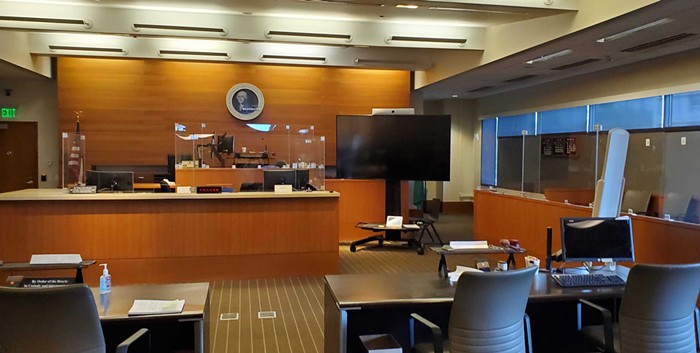
Rarely do government bureaucrats admit that they hope to work themselves out of a job. But when I interviewed Judge Damon Shadid after he ran through a full Community Court docket last week, that was his core message.
He didn’t mince words after slogging through more than thirty cases of misdemeanor trespass, shoplifting, and other minor offenses that morning: “If an adequate social safety net existed, most of these crimes would not happen,” he said. Instead, in Seattle, the people who fall through the gaps in our social safety net and then commit minor crimes of survival wind up in Community Court.
What awaits them is a shockingly dignified experience relative to mainstream court. Shadid and the court’s support staff demonstrated empathy and a seemingly genuine interest in helping to solve the core problems driving people to commit these low-level crimes in the first place. Rather than a jail cell and a single phone call, Community Court’s support staff proactively helps participants obtain IDs, sign up for Apple Health, and connect with other government assistance programs to meet their basic needs.

The first case on the docket the morning I observed the court showed the unnecessary cruelty that pervades much of our mainstream criminal legal system. The City Attorney’s Office had accused the person appearing that morning of committing petty theft at a downtown business and then lying to the arresting officer. Had the City Attorney prosecuted him in a traditional court, he would have faced pressure to plead guilty to avoid the disruption of a trial – regardless of whether he had actually committed the crime. That guilty plea would then make it harder for him to find or keep a job, which in turn would have increased the likelihood that he would re-offend.
Instead, his case was referred to Community Court, where the program’s support staff connected him to services. With those connections complete, he graduated from the program without a criminal conviction that would have made finding work and housing more difficult. Everyone in the room congratulated him on his graduation, and he expressed gratitude for the assistance he’d received.
Most of the cases I observed followed a similar course. People called in to provide updates on their progress or to appear for the first time to talk with pre-trial counselors who would help them navigate the program. And despite their public rhetoric about the program’s supposed limitations, the line prosecutor from the City Attorney’s Office rarely objected to Judge Shadid’s administration of these low-level misdemeanor cases.
One source of tension between the prosecution and judge arose when someone failed to appear for their court date. Typically, the City Attorney’s lawyer would either seek to exclude the case at issue from Community Court or ask the judge to issue a warrant. The exclusion would return the case to mainstream court or to a plea-to-play court such as drug court, and the warrant would give cops the authority to arrest and book the person who had no-showed into jail.
Shadid frequently overruled those requests, but only after conducting an in-depth review of the person’s criminal record. Washington’s Supreme Court instructs judges to issue warrants only when the person presents a substantial risk of violent crime, and most of the people with cases in Community Court don’t have a criminal history to justify that finding.
He did issue warrants in a few cases. However, even in that aspect of court administration the program treats people more humanely than a mainstream court would. In those cases, Shadid issued what are called “personal recognizance” warrants, which allow people to quash the warrant and avoid jail by voluntarily coming to the courthouse and agreeing to a new court date.
During our interview, Judge Shadid connected his reluctance to screen people out of the program or issue warrants that would land them in jail to the broader goal of the program. In his view, Community Court exists primarily to get people the help they need to escape poverty or to treat behavioral and mental health conditions. Booking people into jail for missing a court date could cost someone a job or their apartment, which would only further destabilize them and make them more likely to commit crimes of survival.
To avoid that, court workers try to help people track their dates and show up on time. Sometimes they even provide prepaid phones to people who can’t afford their own cell phones, Shadid said. That may seem like a small thing, but it demonstrates the program’s pragmatic approach to trying to solve the underlying problems that bring people into Community Court in the first place.
Ultimately, it was Ted Taylor’s case that threw into sharp relief the inherent contradiction of using the criminal legal system as a social safety net of last resort. (Note: I am not using the person’s real name to protect their privacy). The City Attorney’s prosecutor unilaterally screened Ted out of Community Court using the office’s newfound authority to bar people they label as “high utilizers” from the program. Instead, the prosecutor wanted his case dealt with in mental health court, where people have to “plea-to-play” by waiving certain rights or agreeing to a guilty plea to avoid traditional prosecution.
Shadid objected, noting for the record that the Court scheduled Ted’s hearing for that morning after he had voluntarily sat for weeks in jail to secure an appointment at an in-patient treatment facility. You read that right. Due to the behavioral health care system’s limited capacity, the lack of beds meant that jail presented the only viable path to treatment for Ted. Shadid explained to me later in our interview that he believes mental health court is more appropriate for people with more debilitating mental illness, or for those who have committed more serious crimes than the charges Ted faced.
Without any mechanism to appeal the City Attorney’s decision, however, Shadid was out of options to help Ted avoid a criminal record. If we had a universal healthcare system with enough capacity to treat everyone who needs help, or a functioning welfare system to provide for Ted’s basic needs, then he’d have likely never ended up in court in the first place.
But as long as we continue to fail society’s most vulnerable by leaving gaping holes in the social safety net, the best we can apparently offer struggling Seattleites is a judge and his team of support staff doing their best to reverse-engineer compassion out of a system designed to dehumanize the people moving through it.



















